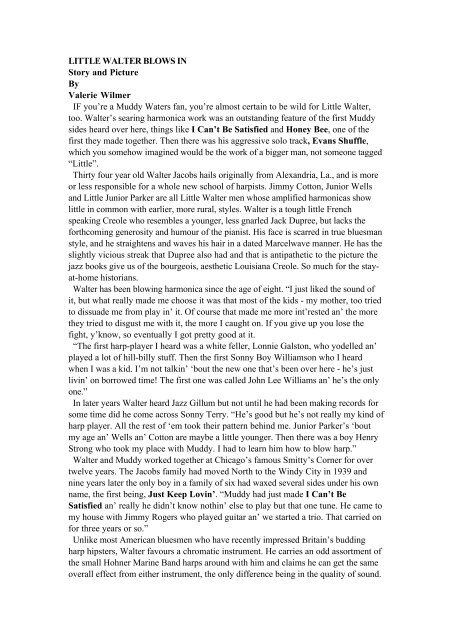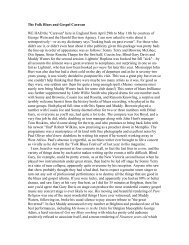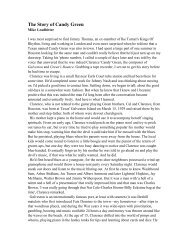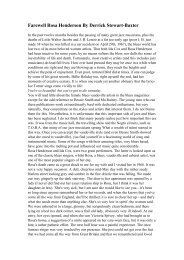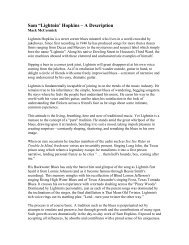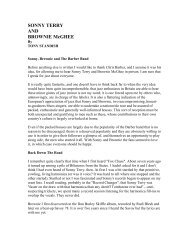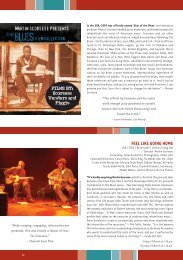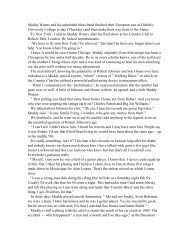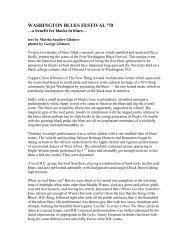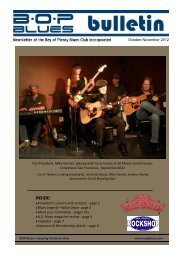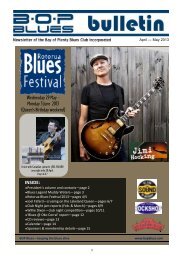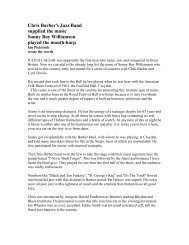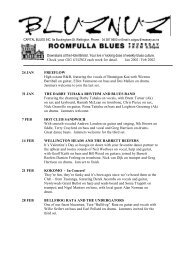LITTLE WALTER BLOWS IN Story and Picture By Valerie Wilmer IF ...
LITTLE WALTER BLOWS IN Story and Picture By Valerie Wilmer IF ...
LITTLE WALTER BLOWS IN Story and Picture By Valerie Wilmer IF ...
You also want an ePaper? Increase the reach of your titles
YUMPU automatically turns print PDFs into web optimized ePapers that Google loves.
<strong>LITTLE</strong> <strong>WALTER</strong> <strong>BLOWS</strong> <strong>IN</strong><br />
<strong>Story</strong> <strong>and</strong> <strong>Picture</strong><br />
<strong>By</strong><br />
<strong>Valerie</strong> <strong>Wilmer</strong><br />
<strong>IF</strong> you’re a Muddy Waters fan, you’re almost certain to be wild for Little Walter,<br />
too. Walter’s searing harmonica work was an outst<strong>and</strong>ing feature of the first Muddy<br />
sides heard over here, things like I Can’t Be Satisfied <strong>and</strong> Honey Bee, one of the<br />
first they made together. Then there was his aggressive solo track, Evans Shuffle,<br />
which you somehow imagined would be the work of a bigger man, not someone tagged<br />
“Little”.<br />
Thirty four year old Walter Jacobs hails originally from Alex<strong>and</strong>ria, La., <strong>and</strong> is more<br />
or less responsible for a whole new school of harpists. Jimmy Cotton, Junior Wells<br />
<strong>and</strong> Little Junior Parker are all Little Walter men whose amplified harmonicas show<br />
little in common with earlier, more rural, styles. Walter is a tough little French<br />
speaking Creole who resembles a younger, less gnarled Jack Dupree, but lacks the<br />
forthcoming generosity <strong>and</strong> humour of the pianist. His face is scarred in true bluesman<br />
style, <strong>and</strong> he straightens <strong>and</strong> waves his hair in a dated Marcelwave manner. He has the<br />
slightly vicious streak that Dupree also had <strong>and</strong> that is antipathetic to the picture the<br />
jazz books give us of the bourgeois, aesthetic Louisiana Creole. So much for the stayat-home<br />
historians.<br />
Walter has been blowing harmonica since the age of eight. “I just liked the sound of<br />
it, but what really made me choose it was that most of the kids - my mother, too tried<br />
to dissuade me from play in’ it. Of course that made me more int’rested an’ the more<br />
they tried to disgust me with it, the more I caught on. If you give up you lose the<br />
fight, y’know, so eventually I got pretty good at it.<br />
“The first harp-player I heard was a white feller, Lonnie Galston, who yodelled an’<br />
played a lot of hill-billy stuff. Then the first Sonny Boy Williamson who I heard<br />
when I was a kid. I’m not talkin’ ‘bout the new one that’s been over here - he’s just<br />
livin’ on borrowed time! The first one was called John Lee Williams an’ he’s the only<br />
one.”<br />
In later years Walter heard Jazz Gillum but not until he had been making records for<br />
some time did he come across Sonny Terry. “He’s good but he’s not really my kind of<br />
harp player. All the rest of ‘em took their pattern behind me. Junior Parker’s ‘bout<br />
my age an’ Wells an’ Cotton are maybe a little younger. Then there was a boy Henry<br />
Strong who took my place with Muddy. I had to learn him how to blow harp.”<br />
Walter <strong>and</strong> Muddy worked together at Chicago’s famous Smitty’s Corner for over<br />
twelve years. The Jacobs family had moved North to the Windy City in 1939 <strong>and</strong><br />
nine years later the only boy in a family of six had waxed several sides under his own<br />
name, the first being, Just Keep Lovin’. “Muddy had just made I Can’t Be<br />
Satisfied an’ really he didn’t know nothin’ else to play but that one tune. He came to<br />
my house with Jimmy Rogers who played guitar an’ we started a trio. That carried on<br />
for three years or so.”<br />
Unlike most American bluesmen who have recently impressed Britain’s budding<br />
harp hipsters, Walter favours a chromatic instrument. He carries an odd assortment of<br />
the small Hohner Marine B<strong>and</strong> harps around with him <strong>and</strong> claims he can get the same<br />
overall effect from either instrument, the only difference being in the quality of sound.
“The big ones have a sound more like an organ, an’ the small one is rather loud unless<br />
you know how to blow it. Music played real low is better to listen to than the loud<br />
stuff. All these young kids they blow so much till they forget what they should really<br />
be sayin’.”<br />
Walter was not impressed to learn of the vast, army of harmonica players the British<br />
R & B craze has thrown up. But later after hearing some of our local boys, he changed<br />
his mind. Speaking of American performers, he said “There are some good musicians<br />
in the white race who can really play their instruments, but they don’t have the<br />
feelin’,” he declared. “You’ve got to live it to know it. You can pretend but that really<br />
ain’t the soul of it. All your music has to have soul an’ without it it’s just ‘pluck,<br />
pluck, pluck’. It’s the same in what they call jazz. When Louis Jordan was makin’<br />
records an’ Nat ‘King’ Cole had his trio an’ Erskine Hawkins an’ Lionel Hampton had<br />
swingin’ b<strong>and</strong>s there was some soul. But the b<strong>and</strong>s now they don’t have the feelin’.<br />
Records today only kids buy ‘em. They look on the title of the record <strong>and</strong> name a<br />
dance after it!” he laughed.<br />
Juke <strong>and</strong> My Babe, two of Walter’s best-selling singles Stateside, have recently<br />
been released here on Pye. “When I made Juke, just ev’rybody got them a harp. Since<br />
then you see them st<strong>and</strong>in’ on every corner blowin’ one o’ them things. Tell you this<br />
— they used to only cost 35 cents in the States <strong>and</strong> now they’re three dollars an’ up.<br />
Seems like it was my record did that!”<br />
Well, a bluesman would not be a real one without his boast, <strong>and</strong> that was Little<br />
Walter’s. His aggressive playing substantiates the boast though as anyone who heard<br />
him in person will agree, He will be in Engl<strong>and</strong> until November 1st, so you have<br />
plenty of time to hear the man who is universally acknowledged to be the King of the<br />
young harpists.<br />
(Jazz Beat, October 1964, p. 14-15. In the Jan. 1965 issue there was a letter<br />
pointing out there’s no harmonica to be heard on I Can’t Be Satisfied <strong>and</strong> that<br />
Honey Bee has LW playing guitar not harp to which VW responded ‘next time I<br />
shall not take any notice of what bluesmen say to me personally but will dutifully<br />
play their records over’)


